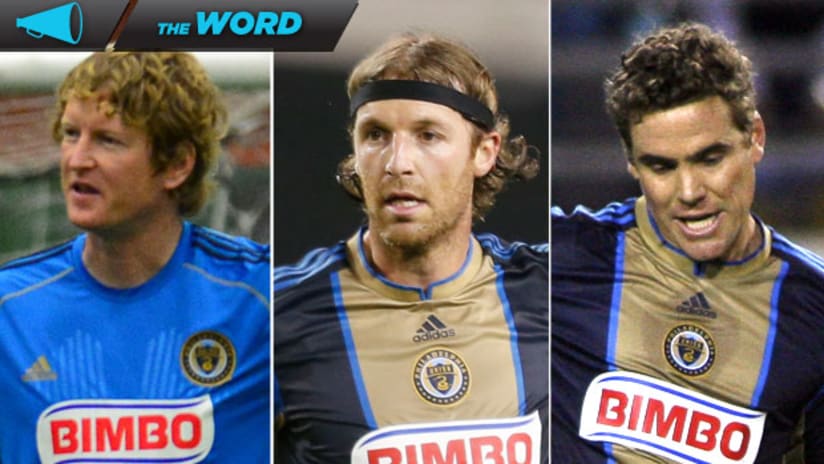Welcome to The Word, a long-form series on MLSsoccer.com that looks at the trending topics and biggest storylines in MLS and North American soccer. In our 2013 debut feature, Philadelphia Union beat writer Dave Zeitlin looks at the Philadelphia homecoming for Chris Albright, Jim Curtin and Jeff Parke, who each grew up in the area and have now returned to help lead the Union during their fourth season in the league.
CHESTER, Pa. – Chris Albright remembers the glass. It was strewn across the dirt field at Piccoli Playground in Northeast Philadelphia, tiny shards that his father and a buddy would have to pick up, piece by piece, before Albright or any of his 8-year-old teammates cut themselves. That was before they’d line the fields. And put the nets up. And pray to the gods of youth soccer that the team’s next game wasn’t at the even-worse field in the Fishtown section of Philadelphia that was made up entirely of cinder.
Jeff Parke remembers the mud. It covered the entire field when he came in from the suburbs to play certain Philly teams, seeping above his cleats while he ran. On the rainy days, it got so muddy that the ball would actually come to a complete stop as he dribbled.
Jim Curtin remembers the lights. All of the players’ parents, as if acting out a dramatic movie scene, would pull their cars to the edge of the dirt area that slightly resembled a soccer field and turn on their headlights. Being able to see the ball, it turns out, is an important part of the game.
Albright, Parke and Curtin were children then, growing up in blue-collar neighborhoods in Philadelphia and the city’s surrounding suburbs. But not even a child’s imagination could predict where they’d end up a couple of decades later: back in Philadelphia, after separate but often intertwined journeys around the country, in a state-of-the-art stadium designed specifically for the sport they once played on mud and cinder, as members of their hometown professional soccer franchise.
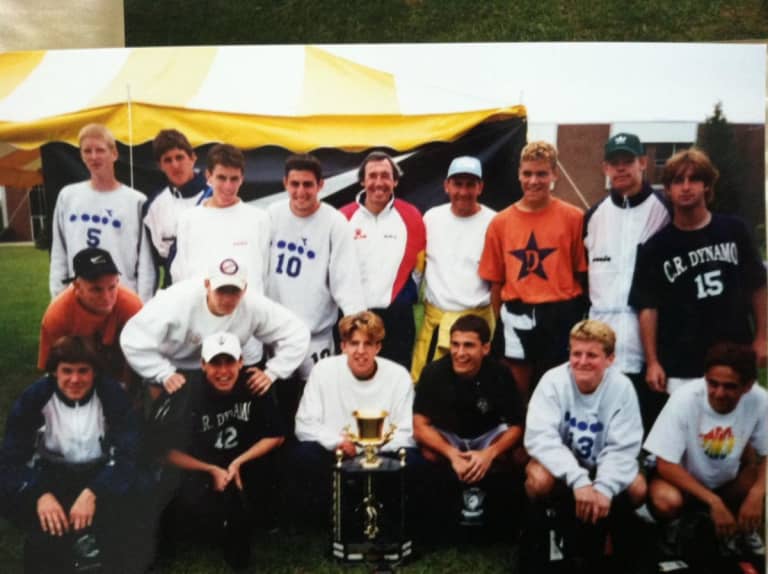
Philadelphia Union assistant Jim Curtin (top row, far left) and defender Chris Albright (top row, orange shirt) as teenagers.
-- Photo courtesy of Jim Curtin
It wasn’t just that that they played on fields where, as Albright bluntly puts it, “grass was like a foreign substance.” There wasn’t anything close to the kind of youth structure that exists today, and no clear pathway to becoming a pro. For much of their childhood, there wasn’t an American league they could watch. And long after MLS was founded, as they climbed the ranks of soccer, from high school to college to the pros, there wasn’t even a team they could call their own.
“All three of us joke around about it all the time,” Curtin says. “When we were 12 or 13 years old, we looked up to good high school players.”
“I wish there was a place when I was younger that I could look and say, ‘I want to be like him,’” Parke adds wistfully. “Whoever the local star was or a guy that played my position.”
Much, of course, has changed in Philadelphia since then. But one thing never has: their love for the city.
That’s why on Saturday, when the Philadelphia Union open their fourth season of existence with a home contest against Sporting Kansas City (4 pm ET, MLS Live), the three local boys will emerge from the tunnel at PPL Park – Curtin as a first-year assistant coach, Albright and Parke as veteran defenders – and know there’s nowhere else in the world they’d rather be.
“It’s not California. It’s not as pretty as Chicago or as nice as New York,” Curtin says. “But it’s home. And people that are from here kind of get it.
“I don’t know why we love it so much sometimes,” he adds with a hearty laugh. “But we do.”
Teammates for life
Sometimes at practice, Union manager John Hackworth will say the words “Coach Curtin,” and Albright will start giggling. Albright and Curtin have been a lot of things over the years – friends, teammates, rivals – but the whole coach-pupil thing still feels sort of weird.
Curtin still remembers Albright as the curly-haired goalscorer on the Council Rock Dynamo club team both played on as teenagers. They were the same age, both born in 1979, but Curtin remembers Albright quickly separating himself from the rest of his peers during a dynamic performance at the Nike Cup one year. Albright was recruited by some of the nation’s premier college soccer programs, earned All-American honors at Virginia and eventually launched a long and fruitful career in Major League Soccer that still lasts today.
Curtin’s road to MLS was less heralded, and more improbable. But, in a roundabout way, he got there because of his old Council Rock Dynamo teammate. A lanky, blond-haired defender, Curtin chose to stay in the Philly area and attend Villanova University, whose soccer program was coached by Albright’s uncle, Larry Sullivan. The Wildcats weren’t particularly good at the time but Curtin says that Sullivan took the time to personally groom him into a star, sometimes even at the expense of the rest of the team.
More than anything else, Curtin believes, that allowed him to get drafted in the third round of the 2001 MLS SuperDraft by then-Chicago Fire coach Bob Bradley and remain in MLS for nine years.
“I credit Larry Sullivan as the biggest player in my development,” Curtin says. “And Chris had him as an uncle.”
READ: Union pay home to Bethlehem Steel with new jerseys
Curtin spent most of his career in Chicago, playing for the Fire from 2001-2008, before finishing up at Chivas USA. Albright started out with D.C. United in 1999, spent six of his most productive years with the Los Angeles Galaxy (2002-07), and followed that with short stints in New England, New York and now Philly.
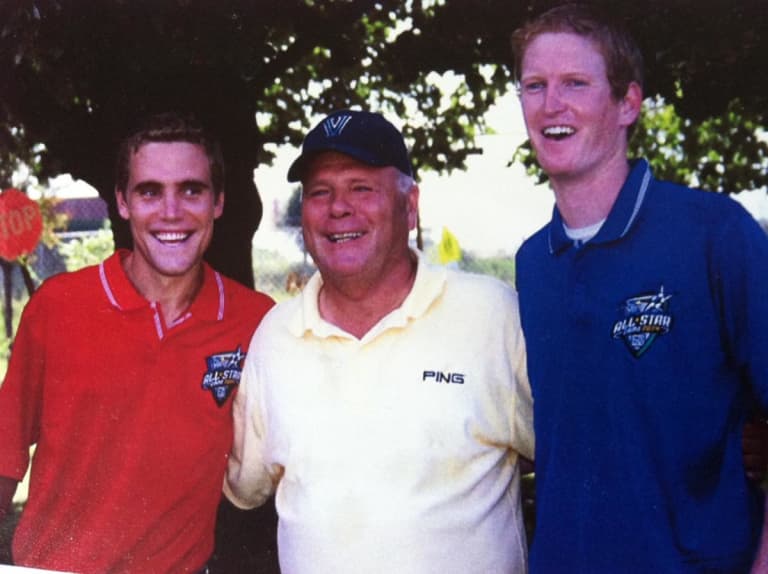
From left: Chris Albright, former Villanova head coach Larry Sullivanand Jim Curtin, after the 2004 MLS All-Star Game.
-- Photo courtesy of Jim Curtin
Once, in 2004, the Fire traveled to Los Angeles to play the Galaxy. Both Curtin and Albright were riding high after playing against each other in the MLS All-Star Game a few weeks earlier, and they followed that up by each scoring their team’s only goal in a 1-1 draw. At the end of the game, the two exchanged jerseys, looked at each other and each said, “Do you believe this s--t?”
Their soccer careers were intertwined in other ways, too. Curtin was playing centerback during a scrimmage at US national camp when Albright was first switched from forward to right back. Unsure of himself for one of the only times in his life, Albright looked at his old buddy and said, “You’re going to have to help me through this because I’ve never looked at the field through this angle.”
Curtin assured him he’d be fine. Albright went on to become one of the league’s best right backs and a longtime member of the national team.
“It’s funny how connected we’ve been the entire way,” Curtin says. “We’re always finding each other one way or another. We’re getting old together, I guess.”
Parke’s unlikely rise
When Jeff Parke checked his phone after a grueling one-on-one basketball game, he was surprised to see he had more than 15 missed calls. He listened to the voicemails. People were screaming. They congratulated him. They wished him luck.
It turned out that while playing hoops, Parke, then a senior at Drexel University in Philadelphia, had been a surprise selection in the 2004 MLS SuperDraft. It was the very last pick – 59 slots after a child prodigy named Freddy Adu went No. 1 overall – but, hey, it still counted, right?
Or … wait? Did it actually happen? Parke went through his voicemails again and realized none of the messages were from then-MetroStars coach Bob Bradley or anyone else from the team that supposedly picked him. He found a number for the MetroStars office and dialed.
“Uhh yeah, I just got drafted?” Parke remembers telling the person who picked up. “What am I supposed to do?”
Bradley got on the line. The former MetroStars coach only knew about Parke because his friend, then-Drexel coach Lew Meehl, sent him a VHS tape of the player’s highlights. In an interview with the New York Times, Bradley said that Parke reminded him of Curtin – “a good presence, good in the air, good, good qualities.” So he took a flyer on another kid from Philly and told Parke to come on up to training camp.
Parke followed Bradley’s instructions and immediately got into his 1991 Subaru Legacy. He was ready to make a great first impression, to prove that a player from Drexel that hardly earned any college accolades could be an MLS star, to show that a Philly kid could make it in New York … and then his car broke down on the Pennsylvania Turnpike.
Eventually, after his mom drove her Jeep to meet him on the middle of the highway and called a tow truck to pick up his beat-up white Legacy, Parke found his way to the MetroStars. He checked himself into a random hotel, scored the game-winning goal in the La Manga Cup in Spain the following week, and, he says today, “the rest is behind me.”
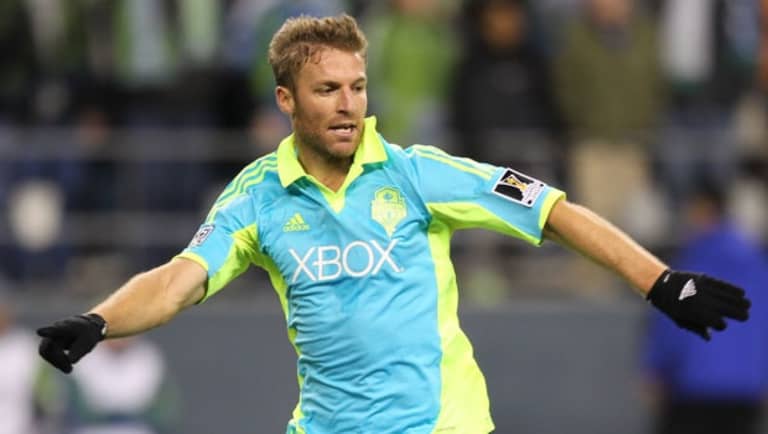
Jeff Parke with the Seattle Sounders in 2012.
-- Getty Images
Not bad for a kid who wasn’t really recruited as a teenager, despite two state titles at Philly-area power Downingtown High School. When nearby Drexel offered him a full ride, he accepted. There he emerged as a feared in-your-shorts defender, often asked to mark the opposing team’s best player. But while he was very good in that role, he said that it made his game boring.
He wistfully looked back at his days as a kid when he got to score a lot of goals. He even thought about quitting again. In fact, to this day, he says that he “doesn’t really like playing as a defender” – which is interesting, considering that’s all he’s done through stops in New York, Seattle and now back in Philly, where he’ll be asked to start at centerback and anchor the team’s backline.
“I don’t like it that much,” Parke says. “It’s done well for me. I probably wouldn’t be a professional if I played any other position.”
He smiles. It’s the kind of smile you might find on a mischievous kid. He knows he’s never going to play anywhere else on the field.
“I’ll just put my hand up whenever they ask for someone to play in the midfield.”
A Philadelphia homecoming
For Albright, it never mattered that there wasn’t grass on the fields he played on growing up. That’s the way it had been for generations in Philly, from one rowhouse neighborhood to the next, and people still loved the game. Albright knew that firsthand. His father, John, played at Temple under Philly’s own Walter Bahr, a member of the miraculous 1950 US World Cup team. His grandfather played in gritty factory leagues. Uncles on both sides of the family were soccer stars. His parents met because of the sport. Both of his siblings played.
Soccer, Albright knew, was just as ingrained in many other families like his – which made it surprising to him that it took so long for the city to be awarded an MLS franchise. When it finally happened, in 2008, he breathed a deep sigh of relief and knew he had to finish his career where it all began.
“It was long overdue,” Albright says. “I think it probably should have been one of the original cities. There’s such a rich soccer history here. And with the fanaticism of the fans, it’s an ideal city for the sport.”
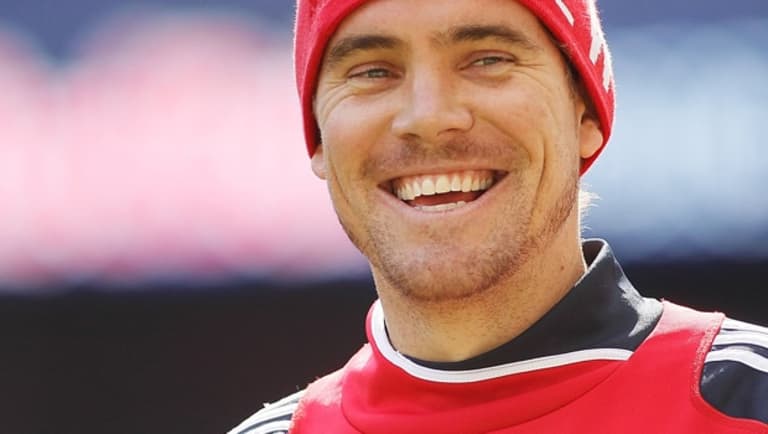
Chris Albright with the New York Red Bulls in 2011.
-- Getty Images
Albright signed with the Union before the start of the 2012 season, offering a veteran defensive presence on the bench while happily enduring old-man jokes from teammates more than ten years his junior.
“For me, it was really a dream,” the 34-year-old says. “And the timing of it worked out so that I was toward the end of my career and could finish it here. A lot of things had to align for that to work out. But they did and I’m grateful for that.”
Parke and Curtin felt similarly about finishing their careers in Philly. In fact, for them, it was less of an option as it was a demand.
Despite enjoying his time in Seattle, where he was named the team’s defender of the year in 2011 and 2012, Parke asked to be traded to Philly when his contract was up. The driving force behind that request was that he and his wife Jennifer, who’s also from the area, just had a baby and they wanted to be closer to family. But there was also more to it than that. The city itself was still in their hearts, and they’ve felt the love ever since returning home following the trade that sent Parke to the Union in December.
“People that live here are just genuine,” he says. “They might be hard people and they might be mean at times, but they’re genuine. They have real heart and passion behind their thoughts and beliefs.
“If I can retire here,” adds Parke, who signed a four-year deal with Philly, “that’s what I want to do.”
WATCH: Union head coach John Hackworth talks lineup choices for season opener
It didn’t work out quite as well for Curtin when he told Chivas USA, where he played in 2008 and 2009, that he was moving his family back to Philly. Curtin doesn’t like to give too many details about what happened next but it’s clear that things didn’t work out between him and former Union manager Peter Nowak, who Curtin played with in Chicago. The longtime MLS defender didn’t even get a chance to try out for the expansion team before the 2010 season.
Instead, he transitioned into a coaching role, first working with the Union’s U-18 academy team, where he often reminded players how lucky they were to be in the Union system and play in a cutting-edge facility like YSC Sports in nearby Wayne – a privilege Curtin and his contemporaries were never afforded. He was then promoted by Hackworth to be an assistant coach on the senior squad last November.
“I think about it every day,” Curtin says about never suiting up as a player for the Union. “It kills me. Very few players’ careers end on their own teams and mine is an example of that. I wanted to come back and play. Things out of my control didn’t allow that.
“I made it clear throughout the league that I was a Philly guy,” Curtin says. “I would literally tell teammates the second Philly gets a team, that’s where I’m going.”
A Philadelphia future
While it means a lot to Albright, Parke and Curtin to be back home, it probably means just as much to the franchise.
It’s not a coincidence that all three players gave up the goal-scoring glory to become hard-nosed defenders, or that Curtin and Parke became MLS stalwarts despite the fact that they were late draft picks, or that all three learned about toughness by playing many different sports growing up.
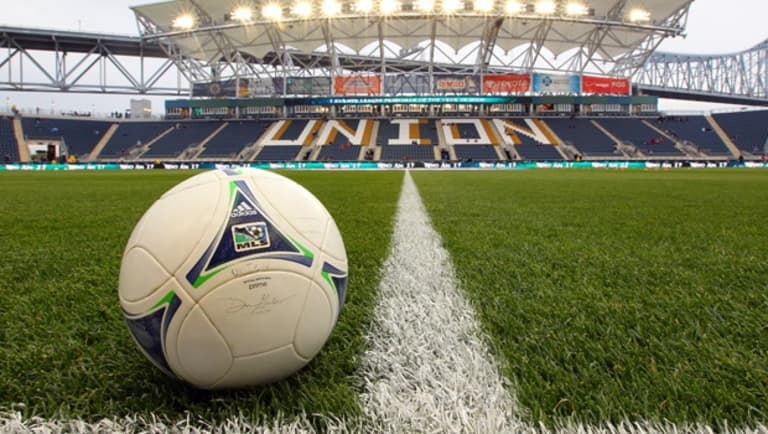
PPL Park, site of the Union's season opener on Saturday.
-- Getty Images
Like many other Philly boys before them and after them, they accomplished things by rolling up their sleeves and going to work. That’s what the Union need.
“We’ve put a premium on the fact that we need to get back to our roots,” Hackworth said. “We know what this city expects. We know the kinds of fans we have and the way that Philadelphia teams in general are expected to play. Having a Jeff Parke, having a Chris Albright, bringing a Jim Curtin onto our staff, those guys know it. They’ve lived it. They’ve grown up in it. It is ingrained. They’re part of the culture. That’s certainly something we wanted to grow in our locker room and our organization.”
Says Curtin, “All three of us have big plans for the Philadelphia Union – not just in day-to-day soccer but in the future. We’re Philly guys. We’re going to be here long-term. Whether it’s in the youth, whether it’s with the first team, whether it’s with the front office, we’re all going to be involved.
“We’re not going to leave. This is home.”
Dave Zeitlin covers the Union for MLSsoccer.com. E-mail him at djzeitlin@gmail.com.

